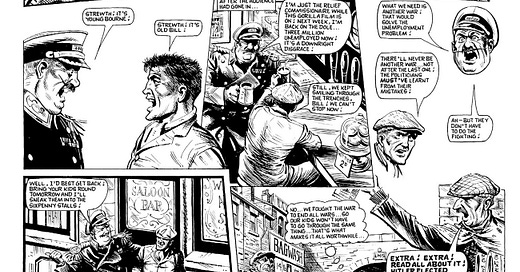Secret History: Charley's War - 1933 & WW2
I still find it upsetting to read the harsh ‘means test’ Charley and his family are subjected to. He decides to go to the library: ‘That’ll kill a few hours. Least it’s warm.’
Welcome to my Secret History of Comics: my new book serialised on Substack. The first section was on Marshal Law: now it’s all about Charley’s War.
If you’re joining me for the first time, you can read the intro to the Secret History here, it’s available for everyone, and so is the intro to Charley’s War.
Every subsequent post has a free preview, but if you want access to my entire rant post, you’ll need to subscribe. Full access to ALL of my Secret History of Comics as I release them every week (plus other perks, check them out), will set you back just £5 per month or £50 per year, and it helps me to continue giving you my best writing. I even have a free seven-day trial on Iconoblast, so you can try it first.
1933
Joe and I had just two pages to show Charley in 1933 and what had befallen him. As always, Joe does a brilliant job. We see Charley thirteen years later, with powerful facial studies that suggest something of the pain he has gone through as a survivor of the Great War and the years that followed. We see him meeting Old Bill as a uniformed cinema doorman where the movie is King Kong. In fact, the doorman was often dressed to suit the film. So on other occasions Old Bill might have been attired as a vampire, a gladiator or a cowboy. That I would dearly like to have seen. Except that he was only the relief commissionaire and would soon be back on the dole along with three million others.
I wish I could have shown what happened to Smith 70 and Young Albert, but there was no space. It would have been something upbeat, because I believe passionately in showing conclusions where working class heroes are triumphant. All too often in films and books they are shown ending up in the gutter and that is calculated and deliberate. So they know their place. In reality, most of us escape, learn from and rise above the privations of our origins and that needs celebrating as a positive role model for readers. Never to ‘know our place’.
I once did a film treatment for a TV company about the fate of an infamous working-class girl in the 1920s who was found in flagrante in a drug induced stupor in a Chinese laundry.
Keep reading with a 7-day free trial
Subscribe to Iconoblast to keep reading this post and get 7 days of free access to the full post archives.




